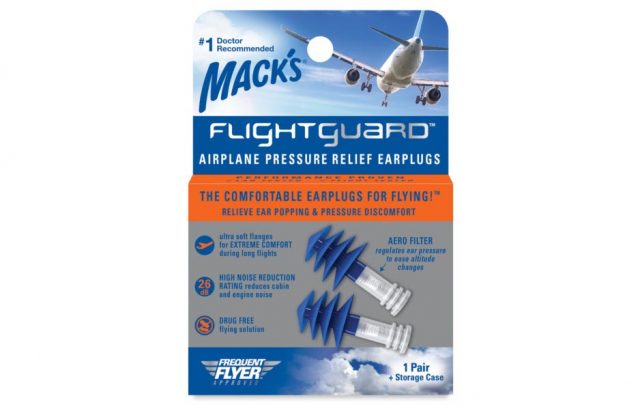
You are packed and at the airport in plenty of time. You navigated security without any hang-ups, visited the check-in counter and made your way to the gate. You are ready to board the plane and head to your destination.
You probably aren’t thinking too much about the noise level on the plane and whether or not traveling by air could be damaging to your ears.
Even if you aren’t a frequent flyer or part of the flight crew, you should still think about protecting your ears while flying.
Protecting Ears When on a Plane
At cruising altitudes, noise levels are typically around 85 dB, but on an older plane the noise may be a little louder, especially towards the back of a plane. Exposure to 85 dB for more than eight hours a day can cause permanent hearing loss or temporary hearing problems like tinnitus. At 100 dB, however, the safe duration of exposure is only 15 minutes a day. To put it in perspective, normal conversation occurs at about 60 dB.
To protect your ears, you may want to consider wearing hearing protection during takeoff and landing and avoiding the nosier areas of the plane—in the rear of the cabin and near the engines or propellers. When choosing the type of hearing protection or ear plugs, there are a lot of good options. Your selection depends on your preferences and comfort level. Even a relatively inexpensive pair of ear plugs will protect your ears.
If you happen to be in a noisier section of the plane or next to a crying baby, you may be tempted to turn up the volume on your personal listening device. Studies have found that people tend to turn up the volume in noisy settings to drown out the noise. For example, one study found that in an 80 dB environment, listeners chose an average listening level of 93 dB. Use of noise cancelling earphones in a loud environment like a plane or public transit can significantly reduce listening levels.
Hearing loss accumulates over a lifetime, so even if you aren’t a frequent flyer, you should protect your ears on every flight. Everyday sounds—music in fitness classes, noisy movie theaters and gas-powered lawn tools—can cause damage to your hearing. Even being exposed to the noise of the subway for just 15 minutes a day (over time) can cause permanent damage to your hearing. If you need to raise your voice to be heard at an arm’s length, the noise level in the environment is likely above 85 dB in sound intensity and could damage your hearing over time.
What is ‘Airplane Ear’?
Maybe you’ve never heard of airplane ear or maybe you didn’t realize it was a possibility. “Airplane ear,” also called ear barotrauma, barotitis media or aerotitis media, is the stress exerted on your eardrum and middle ear tissues when the air pressure in your middle ear and the air pressure in the environment are out of balance. It is usually caused by eustachian tube dysfunction. Patients who suffer from severe seasonal allergies or common colds, ciliary dysfunction, sinonasal disease and immunodeficiency are at higher risk of developing airplane ear.
Why Does it Happen?
Typically, people experience pressure or pain at the beginning of a flight when the plane is climbing or at the end when it is descending. It is important to stay awake during takeoff and landing to protect your ears. The discomfort you feel in your ears is your body prompting you to equalize the air pressure in your ears. If you’re sleeping, you won’t feel the discomfort in your ears that cues you to yawn or swallow to force air through the eustachian tubes.
Protect Yourself from ‘Airplane Ear’
The good news is that there are several ways to protect yourself from airplane ear. Usually yawning, swallowing, sucking on candy or chewing gum—can prevent or correct the differences in air pressure and improve symptoms. When you swallow, you may notice a small click in your ears. That is a bubble of air being moved through the eustachian tube. Those bubbles are constantly moving into the middle ear, where they balance the ear’s inner pressure. Airplane ear occurs when those tubes become blocked.
According to the Mayo Clinic, there are several steps you can take to protect your ears:
- Use the Valsalva maneuver during ascent and descent. Gently blow, as if blowing your nose, while pinching your nostrils and keeping your mouth closed—repeat several times.
- Stay awake during takeoff and landing so you can swallow and yawn to equalize the pressure in your ears.
- Don’t fly (if possible) when you have a sinus infection, nasal congestion or an ear infection.
- Use filtered earplugs to equalize the pressure against your eardrum during ascents and descents.
- Use an over-the-counter decongestant nasal spray and/or oral decongestant pills about 30 minutes to an hour before takeoff and landing to help open the eustachian tubes and equalize pressure on the eardrums.
- Take your allergy medication about an hour before your flight.
When to Seek Help for Your Ears
Symptoms of airplane ear usually resolve spontaneously. Within a few hours after the flight, the feeling of fullness in your ears or muffled hearing should dissipate. If the discomfort lasts more than a few hours or if you experience any severe signs or symptoms, you should visit a doctor.
Schedule Your Hearing Assessment
Take the first step in having your hearing checked by a licensed hearing professional. It only takes one minute to request an appointment for your hourlong hearing assessment. Call 866-837-8286 (866-TEST-AT-60) or visit campaignforbetterhearing.us today.
Want More Answers to FAQs About Hearing Health?
Is Hearing Loss A Sign of Dementia?





